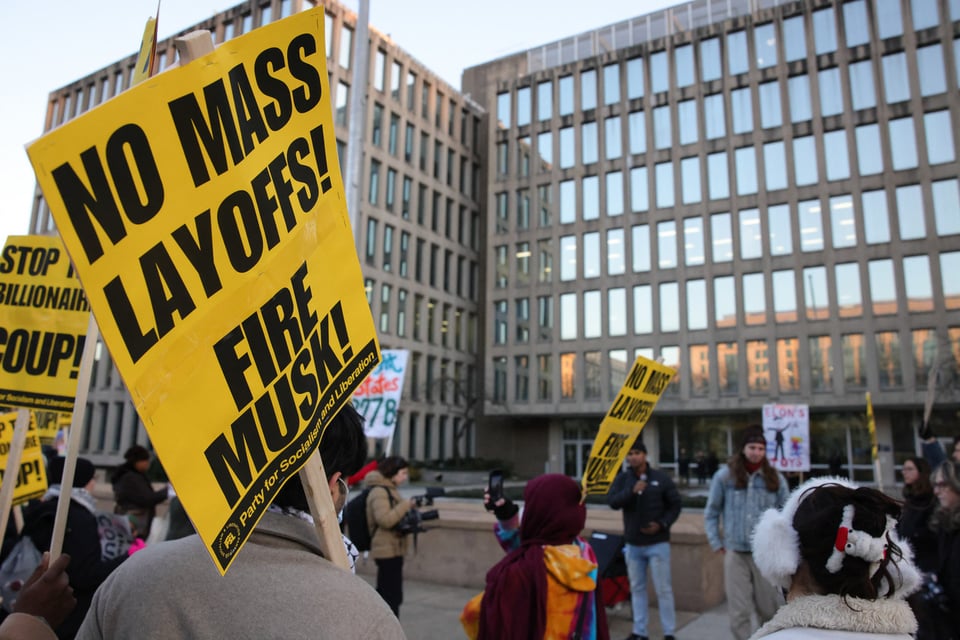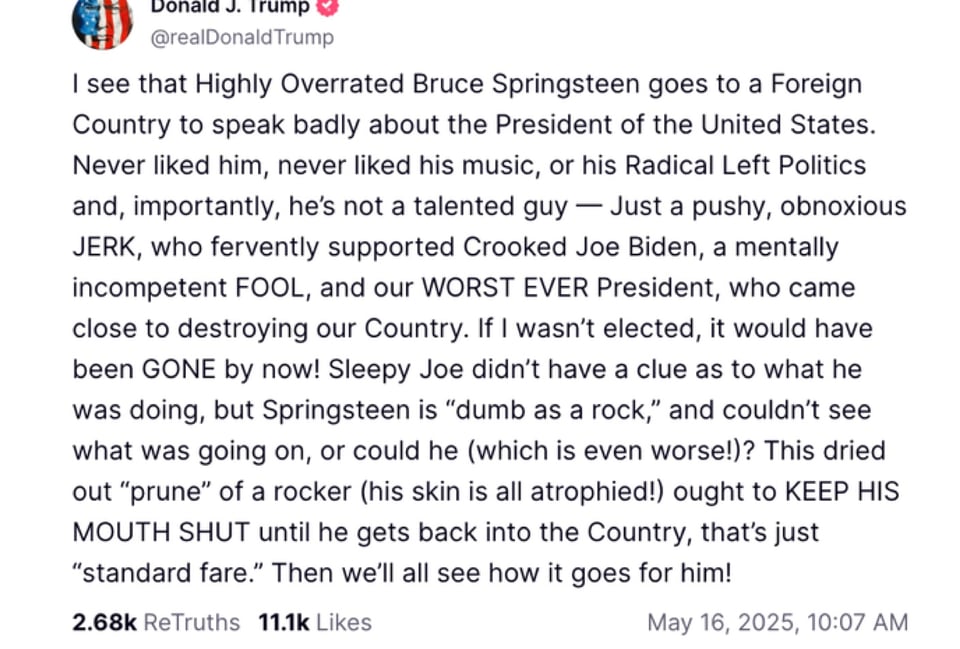Saturday, May 17, 2025. Annette’s Roundup for Democracy.
Trump's agenda meets broad resistance from American institutions.

Educational institutions, law firms, broadcasters, nonprofits and corporate shareholders are all currently fighting or rejecting the Trump administration's policies and executive orders.
Why it matters: Widespread pushback against President Trump's agenda is starting to take shape.
Driving the news: Shareholders from major U.S. companies like Apple, Costco, Coca-Cola, Goldman Sachs and, most recently, Berkshire Hathaway have overwhelmingly rejected anti-DEI proposals pushed by conservative activists.
- While the Trump administration has revoked federal grants and threatened Harvard's tax-exempt status, the university continues to fight back and is suingthe administration.
- Nonprofits like the Ford Foundation, the Gates Foundation and the Charles Koch Foundation are preparing for a fight, should the administration attempt to pull tax-exempt status, the Wall Street Journal reports.
- Meanwhile, the Corporation for Public Broadcasting is suing Trump for attempting to fire members of CPB's board.
- Law firms Jenner & Block, WilmerHale and Perkins Coie are legally challengingTrump's executive order that targeted them for employing or representing his critics and sought to freeze their security clearances.
Plus, individual executives are starting to speak out.
- REI's new CEO Mary Beth Laughton recently apologized for the company's January endorsement of Trump's then-nominee for secretary of the interior, Doug Burgum, for example.
By the numbers: A recent survey conducted by Weber Shandwick and KRC Research found that roughly 6 in 10 Americans describe the state of democracy and democratic institutions as "volatile," with 75% saying businesses should take a stand to "protect democracy."
What they're saying: "At a time when trust in government is waning, business has emerged as a rare beacon of optimism and civility," says Sheila Mulligan, president of Weber Advisory.
- "This gives C-suite leaders greater license — and responsibility — to lead on issues shaping our economy and democracy. But that influence must be exercised with discipline, grounded in business and cultural relevance, stakeholder expectations, and aligned with enterprise values."
Between the lines: Leaders from the tech and pharmaceutical industries have sought to work closely with the administration, but are still getting hit by its policies.
- "You know, they all hated me in my first term," Trump said during a recent commencement address. "And now they're kissing my a**. All of them."
- Yes, but: The incentive to fall in line could be fleeting.
What to watch: The pushbacks we are seeing across sectors could signal that American institutions are feeling more emboldened to realign their corporate values or commitments.
- It could also signal they have no other choice, given the existential implications of these executive orders.
- Regardless, corporations, executives and institutions are beginning to communicate more forcefully than they have since Trump's inauguration.
What's next: Federal agencies must submit their lists of those they believe are in violation of federal civil rights or contracting rules because of DEI-related practices to the White House by May 21. (Axios).
The new law firms being founded to fight Trump

Demonstrators gather outside of the Office of Personnel Management in Washington, D.C., on Feb. 7, 2025 to protest federal layoffs.
A new wave of law firms founded to meet the legal needs of civil servants and government critics is emerging in Washington as the industry responds to the first months of President Donald Trump’s administration.
Veteran litigators and former government attorneys have begun announcing the formation of new law firms aimed at representing individuals targeted by the president and government employees impacted by mass layoffs across the federal workforce. At least three such firms have opened their doors in the last two weeks.
“What we’re doing is a natural consequence of the way the administration is behaving,” said Clayton Bailey, a former Justice Department litigator who last week co-founded the Civil Service Law Center, a new firm that bills itself as “representing federal workers seeking fair treatment from an increasingly unfair government.”
“When you start doing a long string of lawless tactics across a number of different areas … it creates a need for more people to fill that gap and try to deal with the endless steam of injustice that’s coming out of the administration these days,” Bailey said.
The White House did not immediately respond to a request for comment.
During the administration’s first 100 days, the White House executed an unprecedented pressure campaign against some of the nation’s largest law firms, sanctioning those associated with Trump’s political enemies and striking deals with others to ensure their legal support in matters supported by the president. One federal judge has already ruled that Trump’s order targeting the firm Perkins Coie was unconstitutional and other judges have mostly halted enforcement of orders against three additional firms.
In response, Abbe Lowell, the veteran defense attorney who has represented Hunter Biden, Ivanka Trump and Jared Kushner, made the first move into the new boutique firm trend on May 2, announcing his departure from Winston & Strawn to start his own firm partially staffed by lawyers who had quit jobs at other major firms in protest of Big Law’s capitulation to the White House.
“I’ve been challenging government overreach of administrations for decades, regardless of political party, and this firm is a natural extension of that work with a handpicked team of skilled lawyers,” Lowell said in a statement. “We are seeing the legal industry weaponized to seek retribution and manipulated for purely political reasons. That’s where we step in.”
Lowell & Associates started with a high-profile client list that includes New York Attorney General Letitia James, now subject of a criminal investigation into alleged mortgage fraud, according to reports. Another client of Lowell’s, longtime Washington national security lawyer Mark Zaid, recently sued the administration challenging the revocation of his security clearance.
While Lowell represents some big names, other new firms boast a focus on representing civil servants whose lives have been upended by the administration’s cuts across the federal workforce. Tens of thousands of federal workers have been laid off since Trump’s inauguration and more cuts are planned, according to data tracked by The New York Times.
“It’s hard to overstate the impact that these actions are having on individuals across the country,” Bailey said of Trump’s cuts to the civil service. Bailey and his co-founder, Jessica Merry Samuels, both quit their jobs at the Department of Justice to start the Civil Service Law Center with the goal of helping affected federal workers get their claims addressed in federal court.
This week, two other former government lawyers announced another firm focused squarely on federal employment law. Pamela Hicks and Greg Pinto, who first met more than 15 years ago when Hicks was at the Justice Department and Pinto was at the Department of Homeland Security, launched the DC Law Collective on Tuesday and already have signed multiple clients.
Civil servants are “the most qualified and committed people you’ll ever meet,” Pinto said. “What’s happening to them is not right and we strongly feel that we have to stand up for them and we have to do something about it.”
Hicks herself was fired earlier this year from her position as chief counsel at the Bureau of Alcohol, Tobacco, Firearms and Explosives, traditionally a career role that doesn’t change with the administration. Hicks served as the ATF’s deputy chief counsel during the first Trump administration.
The sheer scale of Trump’s attacks on the federal workforce is driving the need for new firms dedicated to this issue, Hicks said.
“There’s always been federal employees who got fired, who felt like they were discriminated against or they were retaliated against for whistleblowing, that has always existed, but there’s never been this scale of need for representation,” she said.
“The process itself is being overwhelmed,” Pinto added. “Everything is being done here on a scale that’s pretty mind-boggling. We wouldn’t have come to this idea and gone ahead and executed it if it wasn’t for what’s going on now.”
There may be more announcements yet to come. Some employment law practices are seeing an uptick in demand for federal employment law expertise under the Trump administration, according to a Bloomberg Law survey. And there is wide acknowledgment among existing federal employment lawyers that Trump is creating massive demand for the service, Bailey, Hicks and Pinto say.
“When you’re joining a field of law … you get concerned, are we going to see any sort of sharp elbows, are we going to see people closing their doors trying to work for themselves? And in the last two weeks I can say that hasn’t been my experience at all,” Bailey said. “It is a space that recognizes that this is a really difficult moment that needs all hands on deck.” (Politico).

The Trump administration will not be allowed to deport a group of Venezuelan detainees accused of being members of a violent gang under a rarely invoked wartime law while the matter is litigated in the courts, the Supreme Court said on Friday.
The justices sent the case back to a federal appeals court, directing it to examine claims by the migrants that they could not be legally deported under the Alien Enemies Act, the centuries-old wartime law invoked by the Trump administration. The justices said the appeals court should also examine what kind of notice the government should be required to provide that would allow migrants the opportunity to challenge their deportations.
The court said its order would remain in place until the U.S. Court of Appeals for the Fifth Circuit ruled and the Supreme Court considered any appeal from that ruling.
Justice Samuel A. Alito Jr. wrote a dissent, arguing that the justices had no authority to hear the dispute at this stage. He was joined by Justice Clarence Thomas.
The ruling deals a sharp blow to the Trump administration’s efforts to deploy the wartime law to pursue swift, sweeping deportations of Venezuelan migrants accused of being members of the gang, Tren de Aragua.
It also suggests that a majority of the justices may be skeptical of whether the migrants have been afforded enough due process protections by the administration before being deported, potentially to a prison for terrorists in El Salvador.
In their order, the justices said that the stakes facing the detainees are “particularly weighty,” citing the case of a Maryland man, Kilmar Armando Abrego Garcia, who was “deported in error” to the El Salvador prison in March. So far, the Trump administration has said it is unable to bring him back, despite an order from the justices to “facilitate” his return.
Under such circumstances, the justices wrote, “notice roughly 24 hours before removal, devoid of information about how to exercise due process rights to contest that removal, surely does not pass muster.”
President Trump reacted with fury to the ruling. “THE SUPREME COURT WON’T ALLOW US TO GET CRIMINALS OUT OF OUR COUNTRY!” he said on social media. In a subsequent post, he wrote, “The Supreme Court of the United States is not allowing me to do what I was elected to do,” and called it “a bad and dangerous day for America.”
Lawyers for the migrants responded with relief.
The decision “means that more individuals will not secretly be sent to a brutal prison in El Salvador,” said Lee Gelernt, a lawyer for the American Civil Liberties Union. He added that the administration’s use of the wartime law “during peacetime, without due process, raises issues of far-reaching importance.”
The Trump administration has attempted to use the law as a tool in its signature initiative to speed the deportation of millions of migrants, leading to a clash with a skeptical judiciary.
Several lower court judges have concluded that the administration has exceeded the scope of the law, which can be invoked only when the United States has been subject to “invasion” or “predatory incursion,” and have blocked the deportation of groups of Venezuelans.
The Supreme Court justices have been asked to weigh in on the Trump administration’s deportation plans a few times in recent months, and they had already stepped in to temporarily block the deportation of a group of Venezuelans held in northern Texas.
Friday’s order came after a high-stakes legal fight between the Trump administration and lawyers from the A.C.L.U. in one of those challenges. The lawyers rushed to the court on April 18 after getting word that Venezuelan migrants detained in Texas and accused of being members of Tren de Aragua, a Venezuelan gang, had received notices of imminent removal and were being loaded on buses, presumably to be taken to the airport.
The group quickly filed a lawsuit in a federal trial court in Abilene, Texas, on behalf of two of the Venezuelans held at the detention center. Justice Department lawyers responded, telling a trial court judge that they had no immediate plans to deport the detainees.
The judge, James W. Hendrix, who was appointed during the first Trump administration, declined to issue an order temporarily blocking the deportations.
The A.C.L.U. subsequently asked the Supreme Court to act instead.
After midnight on April 19, the justices temporarily paused the deportations, writing, “The government is directed not to remove any member of the putative class of detainees from the United States until further order of this court,” the order said.
The justices moved swiftly that night, and the emergency application had been pending before the court since.
Solicitor General D. John Sauer had urged the justices in a court filing to allow lower courts to weigh in before intervening further in the case. He did not address the specifics of the A.C.L.U. claims that the deportations had been imminent, with buses being loaded for the airport. Rather, he said the government had provided notice to detainees subject to imminent deportation and that they “have had adequate time to file” claims challenging their removal.
In a reply to the court, the A.C.L.U. disputed this, arguing that the Trump administration had taken “actions contrary to this court’s specific ruling” that the government provide notice and time to challenge deportations.
Instead of providing notice to allow detainees to challenge their removal, the group’s brief said, “the government gave detainees an English-only form, not provided to any attorney, which nowhere mentions the right to contest the designation or removal, much less explain how detainees could do so.”
Earlier this week, Mr. Sauer again nudged the justices to allow the deportations. In a filing, the administration contended that “serious difficulties have arisen” from the detention of the group of 176 migrants who had been shielded from removal by the court’s emergency overnight ruling last month.
The Trump administration claimed that on April 26, a group of 23 migrants had barricaded themselves inside a housing unit for several hours, threatened to take hostages and harm immigration officers, and tried to flood the unit by clogging the toilets.
“The government has a strong interest in promptly removing from the country” gang members “who pose a danger” to immigration officers, facility staff members and other detainees, Mr. Sauer wrote.
There have been few public glimpses into the conditions at the Texas facility. On April 28, Reuters captured aerial images of the men held there. In the dirt yard of the detention center, 31 men, some wearing red jumpsuits designating them as high-risk, formed the letters SOS. (New York Times).

This 👇
Touch to watch the Boss speak to power.
Preach it Boss ♥️♥️
— Abier (@abierkhatib) May 15, 2025
Bruce springsteen pic.twitter.com/St1ggXLsXd
And yes, “this” leads to that.👇

Trump dares to threaten Springsteen. Who wins that?!
Do what you can. When you can.
On May 2, Trump called for the elimination of the National Endowment for the Arts, and thousands of arts organizations across the U.S. had their grants canceled. Here’s a searchable, alphabetical list of those affected; chances are you’ll recognize some of the names on here. They all matter but You may want to make gifts to those that especially matter to you.
You may have heard, the WNBA started last night.

You may have heard, the New York Knicks beat the Boston Celtics 119-81.
They advanced to the Eastern Conference Final in the NBA for the first time since 2000.
They will play the Indian Pacers on Tuesday.

Wearing 25, Mikal Bridges. He is a 6’6” small forward, 28 years old, from Villanova. Number 11 for the Knicks is Jalen Brunson. 28-year-old point guard, standing 6’2” tall from Villanova. Number 32 on the New York Knicks is Karl-Anthony Towns. He is a 7-foot center, 29 years old, from Kentucky.
There are 4 Villanova players on the Knicks, and Rick Jalen (Jalen’s Dad), assistant coach for the Knicks, who was trained at Villanova by Coach John Cheney, was a Knick in 2000.
Who do you think Pope Leo, Villanova ‘77, is rooting for?
May the Force be with them.
I will be back on Tuesday. Enjoy the weekend.
https://vlipsy.com/clips/bM9OjBeW](https://vlipsy